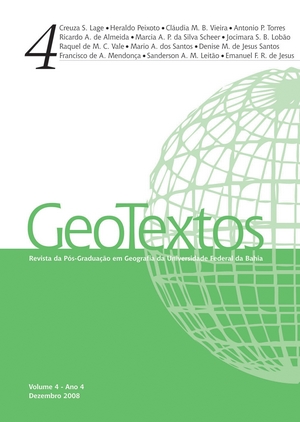INTERFACES BETWEEN PRATICES OF WASTE SEPARATION AND CONCEPTS OF LEFEBVRE
A CASE STUDY OF PITUBA/SALVADOR-BAHIA
DOI:
https://doi.org/10.9771/1984-5537geo.v4i0.3299Keywords:
Urban solid waste, Selective collects, Social appropriationAbstract
This essay intends to analyse the different forms of social appropriation that derives from practices of home waste separation that occurs in the city of Salvador. Based on empirical evidences and on a dialectic argumentation between a conceptual triad (conceived, perceived and experienced spaces), the study conducted among residents and domestic workers in the area of Pituba (that accumulates experiences of official interventions that culminated with the implementation of Salvador Recicla Programme), unveils that the criterion utilized to define the geographic area where the programme took place, specially the levels of education, and high incomes/consumptions, does not present any technical consistence. The scientific investigation of how home waste is separated demonstrates that, in general terms, the high/medium classes with the highest levels of education developed a “limited appropriation” of the actions of the Program that, even though recognized by the conceived, does not become effective as an experience, but only as a perception. On the other hand, those with lower levels of education and income/consumption establishes an appropriation that even though it is not recognized by the conceived, assures on daily practices the incorporation of home waste separation as something experienced and not only perceived.Downloads
Downloads
Published
How to Cite
Issue
Section
License
Autores que publicam nesta revista concordam com os seguintes termos:
Autores mantém os direitos autorais e concedem à revista o direito de primeira publicação, com o artigo simultaneamente licenciado sob a Licença Creative Commons Creative Commons CC BY que permite o compartilhamento do trabalho com reconhecimento da autoria e publicação inicial nesta revista. Esta licença permite que outros distribuam, remixem, adaptem e criem a partir do seu trabalho, mesmo para fins comerciais, desde que lhe atribuam o devido crédito pela criação original. É a licença mais flexível de todas as licenças disponíveis. É recomendada para maximizar a disseminação e uso dos materiais licenciados. Ver o resumo da licença em: https://creativecommons.org/licenses/by/4.0/ Ver o texto legal da licença em: https://creativecommons.org/licenses/by/4.0/ Consulte o site do Creative Commons: https://creativecommons.org/licenses/?lang=pt
Autores têm autorização para assumir contratos adicionais separadamente, para distribuição não-exclusiva da versão do trabalho publicada nesta revista (ex.: publicar em repositório institucional ou como capítulo de livro), com reconhecimento de autoria e publicação inicial nesta revista.
Autores têm permissão e são estimulados a publicar e distribuir seu trabalho online (ex.: em repositórios institucionais ou na sua página pessoal) a qualquer ponto antes ou durante o processo editorial, já que isso pode gerar alterações produtivas, bem como aumentar o impacto e a citação do trabalho publicado (Veja O Efeito do Acesso Livre).






